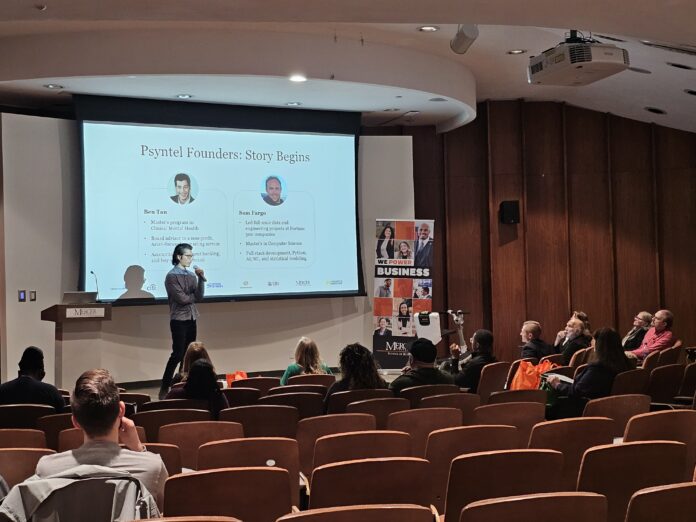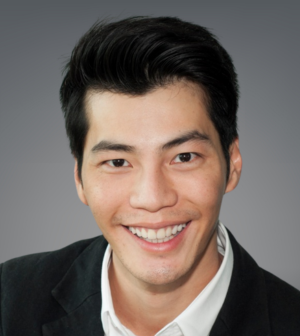
A Mercer University graduate student is harnessing the power of artificial intelligence to support therapists and improve patient experiences.
Benjamin Tan, who is pursuing a master’s in clinical mental health counseling in the College of Professional Advancement, is cofounder of Psyntel, a mental health startup. Psyntel — the name combines the words “psychology” and “intelligence” — offers therapists an AI-enabled tool to enhance patients’ treatment journey.

“It is a tool that works in the background with the therapist,” Tan said. “The therapist is front and center of any treatment journey because we believe in the human touch. We’re not trying to replace therapists, but we are complementing the process.”
Tan, who has over a decade of experience working in banking and finance in Singapore, serves as the company’s chief financial officer. He cofounded Psyntel with software engineer Sam Fargo, who is the chief technology officer.
Psyntel’s platform is based on a large language model, like the AI that powers ChatGPT. To use it, therapists have their patients fill out a questionnaire and enter their answers into the AI tool, which is compliant with federal privacy laws, Tan said. Therapists also may choose to input notes on their patients as well.

Psyntel then creates psychological profiles that may be used as a basis for treatment. As additional data is added to the tool, it can provide insights on patients’ progress. Therapists may ask it questions about specific client concerns or theoretical considerations and receive assistance building customized treatment plans.
“We’ve created a dedicated platform that not only has a lot of information on the client, but it’s able to intelligently discuss and engage with the professional to form different perspectives, to lend a certain degree of objectivity to a process that would otherwise be 100% subjective,” Tan said. “And it honors the core element of therapy, which is the human element.”
Tan said he and Fargo both have participated in therapy following traumatic experiences. They believe in the healing power of therapy and that the addition of AI could improve its effectiveness, he said.
The pair started working on the idea for Psyntel in fall 2023 and incorporated the company in February. Tan talked with his counseling professor, Dr. David Lane, about the project.
“Benjamin was in my psychopathology and diagnosis course. One of the concepts we stress over and over in the diagnosis class is that diagnosis drives treatment,” Dr. Lane said. “The Psyntel concept has tremendous potential, especially for young clinicians who are still working to fully understand the complexity of diagnosis, and for seasoned therapists who want help narrowing diagnostic impressions for complex cases. Psyntel could be a wonderful aid for treatment by helping clinicians refine diagnoses and thereby clarify and enhance treatment planning.”
Tan and Fargo are self-funding the project, which is now in beta testing.
“We already have deployed our software to mental health professionals who are using it on their patients,” Tan said. “That process itself is very intimidating — to put the tool out there in the wild and have it used by actual professionals — and at the same time, we’ve gotten a lot of feedback, so we continue to work on the next iteration of our software.”
Through Mercer, Tan has participated in various pitch competitions, which allowed him to receive valuable feedback from business professionals.
Tan won the judge’s award and the audience award at Mercer’s First Pitch Friday in March on the Atlanta campus. He recently represented Mercer and tied for first place in the virtual Sigma Nu Tau Video Pitch Competition. He also participated in a program at Atlanta Tech Village in the spring.
“I was grateful for all those opportunities,” Tan said. “I felt that it was a good kind of catalyst for our business because it gave us a lot of different ideas, and it brought us many different perspectives of our business and how we would pivot.”
Dr. Briana Stenard, associate professor of management and entrepreneurship in the School of Business, mentored Tan. She said he is innovative, dedicated and passionate about his business.
“I highly recommend students who have a business idea to enter pitch competitions as Ben has done,” she said. “Participating in pitch competitions is not just about winning; it’s an invaluable opportunity for aspiring entrepreneurs to refine their business ideas, gain critical feedback, and connect with industry experts. These competitions provide a platform for student entrepreneurs to showcase their vision, develop their communication skills, and build resilience which are all essential qualities for building a successful business.”









